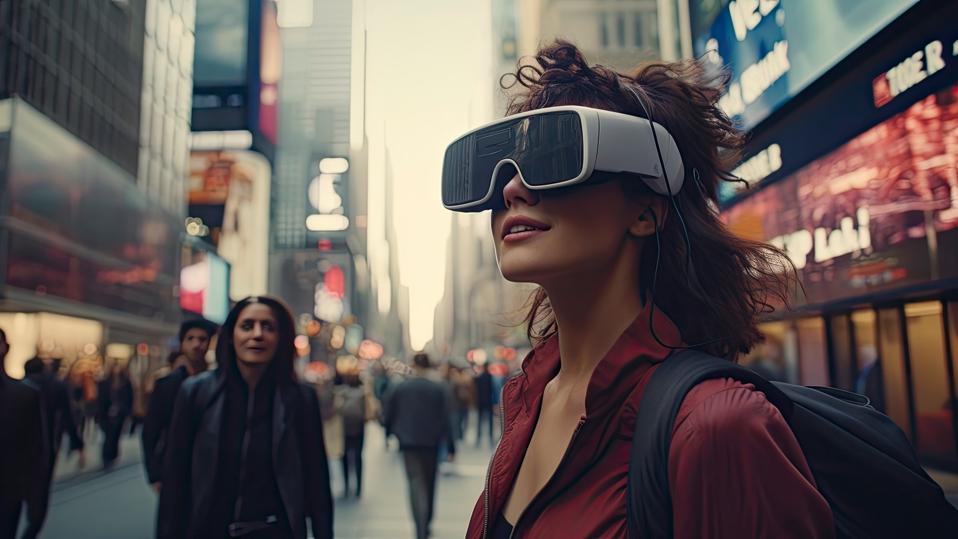5 Problems And Solutions Of Adopting Extended Reality Technologies Like VR And AR
18 June 2021
Extended reality (XR) technologies, like virtual reality (VR) and augmented reality (AR), bring many benefits to us as consumers, and to the industries that adopt them. But we can’t ignore the fact that there are many personal and societal risks that come with XR, particularly at the more immersive end of the spectrum (i.e. VR).
In this article, I address five of the biggest concerns around XR, and outline a safer, more ethical way forward for the technology.

1. Legal concerns
As with any technology that advances faster than legal systems can cope with, regulators and lawmakers are left playing catchup. XR is no exception. As a result, we don’t have clear laws on what’s acceptable and unacceptable in virtual environments – or even which jurisdictions those environments come under.
One of the biggest unanswered questions for me is, can a virtual act be a crime? Say two people are immersed in a virtual environment, and one of them assaults the other in that virtual space. Is that a crime? If we consider video games – where many people enjoy beating up or shooting our fellow gamers – the question seems a bit ridiculous. But XR technologies create a much more immersive experience than the average video game. In our hypothetical virtual situation, the assault might seem very real to the victim. Is it a crime then? What if our two hypothetical people are wearing haptic suits, which allow users to feel realistic sensations that are generated in the virtual world? This could potentially make the assault genuinely traumatic.
2. Moral questions
This conundrum on what should and shouldn’t be allowed in a virtual environment isn’t just a legal question. It’s a moral issue, too. The danger with immersive technologies is they can allow people to act out whatever they want, seemingly without any real-world consequences. Some might say this is fairly harmless, but this crossing of moral boundaries (boundaries that exist in the real world) certainly makes me uncomfortable.
Consider this example: with the way XR technology and accessories are advancing, it will be theoretically possible for someone to render a highly realistic avatar of their neighbor or colleague or friend and then have sex with them in a virtual setting. Should that be allowed? It’s immoral, sure. But is it wrong to commit immoral acts purely in a virtual world? In my view, if something isn’t allowed in the real world (like having sex with someone without their knowledge), it shouldn’t be allowed in the virtual world.
3. Access for the few, not the many
There’s also the possibility that XR technologies will widen the gap between the haves and the have-nots. The cost of purchasing XR hardware will obviously exclude many people, potentially exacerbating existing social divisions. One of the things I talk about in my book is how XR has the potential to revolutionize learning and provide enriching educational experiences for children. But if these opportunities aren’t available to all, we risk creating even more elitist education systems.
4. Privacy and security
This is a huge and very complex concern, so I’ll just give a quick summary here. Like most new technologies, XR brings with it some significant challenges related to personal data. Except, in this case, the data can be extremely personal and sensitive, potentially including our most intimate behaviors and thoughts.
Let's take eye-tracking technology – which is already being incorporated into VR and AR headsets – as an example. This brings many advantages in terms of the quality of the graphics and responsiveness. But eye-tracking also enables companies to collect highly personal data on your unconscious responses to visual cues (whether virtual, as in the case of VR, or real-world cues, as in the case of AR).
Patterns in our eye movements show what we’re focusing on at any given time, which gives an insight into our preferences and thoughts, rather like an unconscious “like” button. And that information could be mined by advertisers to serve up related ads. If that seems harmless, how about this: your eye movement data could give away your sexual orientation and, specifically, who you’re attracted to.
5. Health concerns
Users who spend a lot of time in VR sometimes report nausea, dizziness and disorientation – a "post-VR hangover," if you will. This is the result of the brain receiving mixed sensory signals (such as your eyes registering movement in the digital environment, while your inner ear knows you’re standing still in the real world – incidentally, mixed signals like this are why we experience motion sickness on boats and in cars). Some people don’t experience these symptoms at all, while others find even a short VR experience triggers after effects. The effects can, in some cases, last up to a week.
Finding a safer, more ethical way forward
Let me stress that the benefits of XR far outweigh the potential downsides. But to fully realize those benefits, and overcome the pitfalls, we must embed notions like ethics, responsibility, safety, and trust in XR technologies. To do this, we need a global code of conduct for XR, like the codes of conduct that are emerging in the field of artificial intelligence.
In the future, I predict irresponsible XR practices will draw public and regulatory ire. So, from a business perspective, it’s vital organizations take proactive action now to ensure their XR experiences are responsible and ethical. This might include:
- Ensuring any XR technology is as inclusive and affordable as possible – especially if your offering is designed for educational or societal use.
- Being open with users about what data you’re gathering, and, where possible, giving them the opportunity to opt out. And where personal data is absolutely vital, you’ll need to take all the same data security measures as you would for any other business-critical process.
Related Articles
What Job Is Most Safe From AI?
As artificial intelligence continues to reshape industries, understanding which jobs remain secure is crucial.[...]
How Mastercard Uses AI Strategically: A Case Study
In the ever-evolving landscape of financial technology, Mastercard stands out as a pioneering force in leveraging artificial intelligence (AI) to drive innovation and operational efficiency.[...]
How Generative AI Is Accelerating Drug Discovery
Generative AI based on Large Language Models (LLMs), the technology behind popular tools like ChatGPT and Google Gemini, is revolutionizing various industries, including the world of drug discovery.[...]
How To Achieve AI Success In Our Day-To-Day Lives
AI is set to change the world in some incredible ways. But as well as shaking up the way we work and potentially solving some of the world’s biggest challenges, it also creates opportunities when it comes to navigating the hum-drum of the everyday.[...]
What Jobs Will AI Replace First?
Artificial intelligence is no longer a futuristic concept; it’s a reality that is transforming industries and reshaping the job market at an unprecedented pace.[...]
How Generative AI Will Change Jobs In Financial Services
From the arrival of the telephone to online banking and mobile payments, many waves of transformation have swept through the banking, insurance and finance industries.[...]
Sign up to Stay in Touch!
Bernard Marr is a world-renowned futurist, influencer and thought leader in the fields of business and technology, with a passion for using technology for the good of humanity.
He is a best-selling author of over 20 books, writes a regular column for Forbes and advises and coaches many of the world’s best-known organisations.
He has a combined following of 4 million people across his social media channels and newsletters and was ranked by LinkedIn as one of the top 5 business influencers in the world.
Bernard’s latest book is ‘Generative AI in Practice’.










Social Media